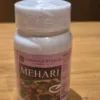Rasona / Garlic
|
Botanical Name |
Allium Sativum |
|
Family |
Liliaceae |
|
Sanskrit |
Ugragandha, Yavanesta, Lasuna, Mahaushadha |
|
English |
Garlic |
|
Hindi |
Lahasun |
|
Kannada |
Bellulli |
|
Malayalam |
Veluthulli |
|
Telugu |
Vellulli |
|
Tamil |
Pundu |
|
Marathi |
Lasuna |
Distribution
Cultivated throughout india mainly in ludhiana, karnataka, tamilnadu, andhra pradesh, u.P and gujrat.
|
Parts Used |
Bulb, Oil |
|
Dose |
Paste: 3-6gm, Oil: 1-2 Drops |
Chemical Constituents
Alliin, carbohydrates, vitamins( vit c, folic acid, thiamine, riboflavin etc), amino acids(arginine, asparagic acid, methionine etc), allinase, allylalcohol, allylpropyl disulphide etc
Ayurvedic Properties
|
Quality (Guna) |
Snighda, Guru, Tikshna, Sara |
|
Taste (Rasa) |
Madhura, Lavana, Katu, Tikta, Kashaya |
|
Metabolism (Vipaka) |
Katu |
|
Potency (Virya) |
Ushnam |
|
Impact (Prabhava) |
Vedanasthapana |
Pharmacological Action
- Its balya and brmhana property helps in emaciated conditions and in general weakness and improving bone density.
- Netrya: helps in curing eye disorders.
- Vrsya: improves functions of the reproductive system.
- Anti oxidant property helps in preventing body against infections.
- Its property helps in reducing high cholesterol levels.
Therapeutic Uses
- Amavata: rasona, shunti and nirgundi decoction is given.
- Yoni roga: juice of garlic is given early in the morning with milk and meat soup as the diet.
- Plihavrddhi: lasuna, pippali mula,haritaki are given with cow’s urine.
- Paste of rasona is applied on joints in certain pains and in arthritis conditions.
- Milk boiled with rasona helps in cough,asthma and in nourishment of the joints.
- Garlic juice given internally helps in improving vision.
- Insect bite swelling disappears if garlic juice is applied.
Some of the common formulations
- Lasunadi vati
- Rasona pinda
- Hingutriguna tailam
- Rasona rasayana
- Lasunadi ghrita
- Rasonashtaka etc




